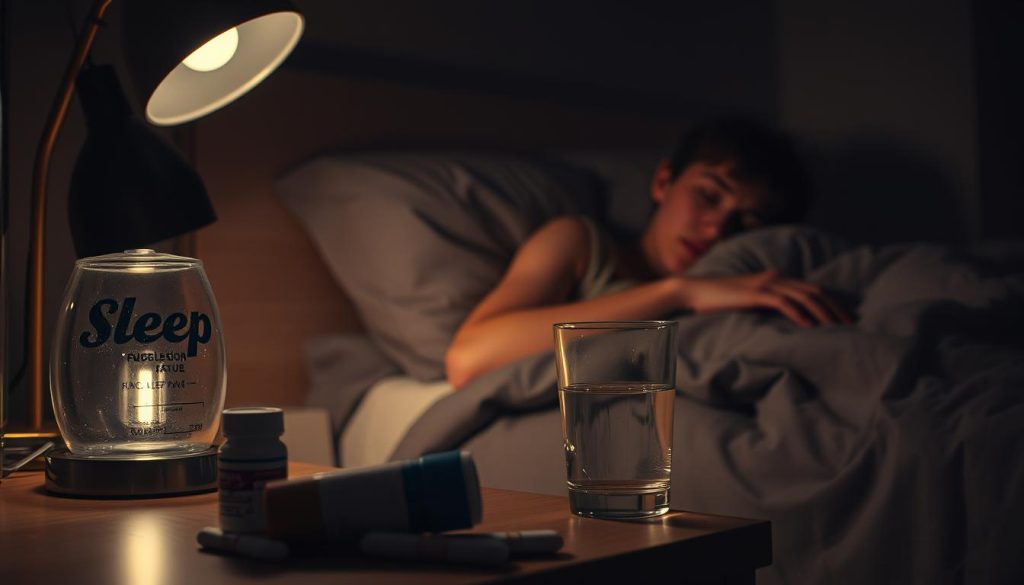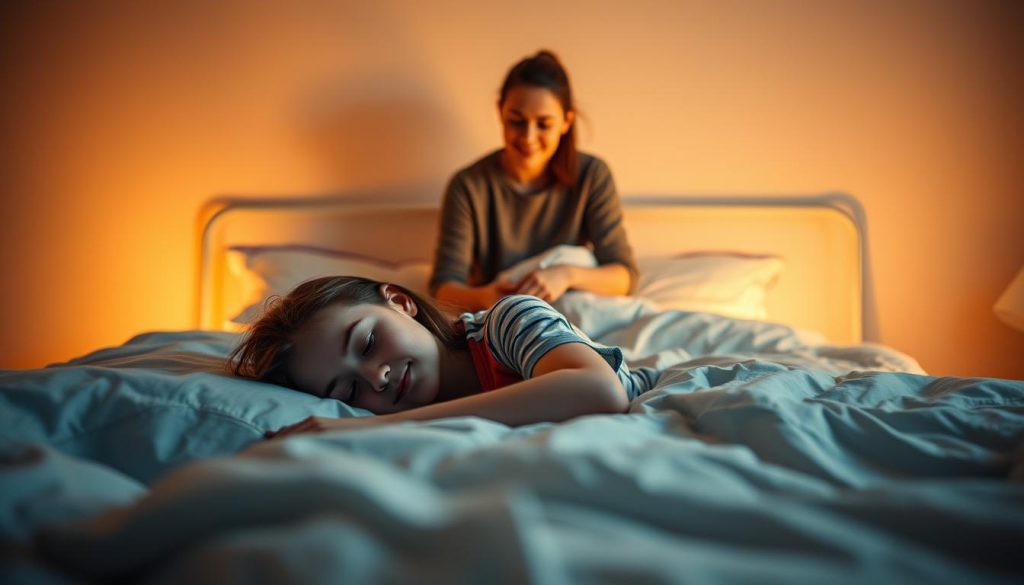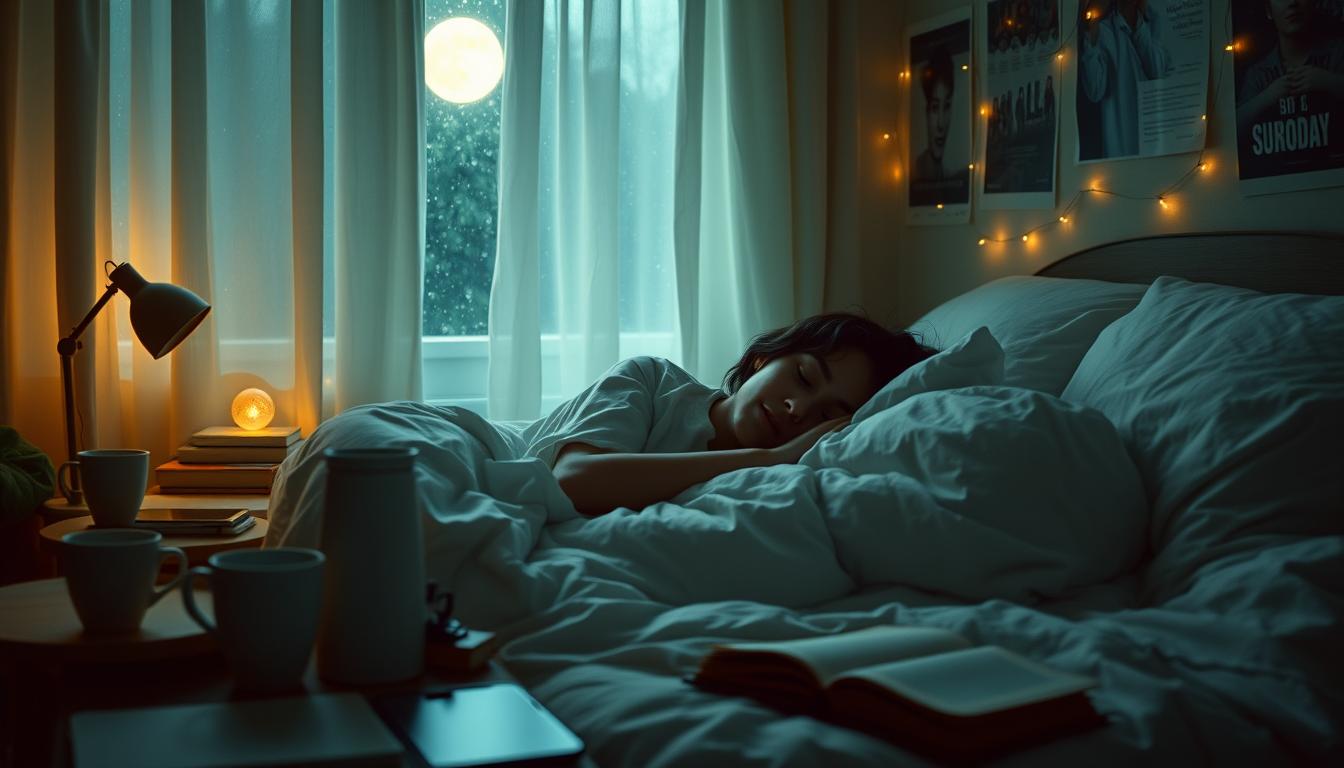It’s important to understand teenage sleep patterns for their health and well-being. Sleep needs and patterns change a lot during these years. This is due to biological, environmental, and social factors.
Teenagers’ bodies start to change as they grow up. Their internal clock, or circadian rhythm, shifts. Modern life, with more screen time and school pressure, makes sleep harder for them.
This guide will explore the complexities of sleep in teens. It aims to offer insights and solutions for better sleep. By understanding their sleep patterns, we can help them live healthier lives.
Understanding Teenage Sleep Needs
Teenagers go through big changes in their sleep patterns. This time is special because of the changes in their sleep needs. It’s important to understand how sleep needs change during this period.
Evolution of Sleep Requirements
Teenagers sleep differently than kids. Younger kids need 9 to 11 hours of sleep each night. As they grow into teens, they need about 8 to 10 hours.
This change helps their bodies grow and change. But, teens also tend to stay up later and wake up later. This is because of hormonal changes in puberty.
Changes During Adolescence
Adolescence is a time of fast growth and change. Teens’ bodies and brains grow quickly. They need good sleep to support this growth.
Teens also tend to sleep later. They need to adjust their sleep habits to fit their natural sleep cycle. It’s key to help them develop healthily.
Factors Affecting Teenage Sleep Patterns
Teenage sleep patterns are complex and influenced by many factors. These include biological, environmental, and social elements. Each plays a key role in shaping how teens sleep.
Biological Changes
Puberty brings many changes that affect sleep. The hormone melatonin, which controls sleep, starts to come out later. This makes teens want to stay up later and sleep in longer.
These biological changes can make sleep issues worse for teens. It’s important to consider these changes when trying to solve sleep problems.
Environmental Influences
The environment where teens live greatly affects their sleep. Things like room lighting, noise, and the overall feel of the bedroom matter a lot. For example, screens before bed can make it harder to fall asleep.
Knowing how the environment impacts sleep helps parents and teens make their bedrooms better for sleep.
Social Pressures and Lifestyle
Social life and lifestyle choices also affect teen sleep. Teens often have busy schedules with school, activities, and friends. This can leave little time for sleep.
Social pressures, like wanting to stay up late with friends, can also disrupt sleep. These pressures can lead to teens not getting enough sleep.
Common Sleep Issues in Teenagers
Teenagers today face many sleep challenges, like *teenage insomnia* and *sleep disorders in teens*. These problems can make it hard to fall asleep or can be more complex, like sleep phase delay. It’s important to spot these issues early to avoid long-term health problems.
*Teenage insomnia* is a big problem where teens struggle to start or stay asleep. They often wake up a lot at night and can’t fall back asleep. This leads to feeling tired and cranky during the day. Without enough sleep, their school work and overall happiness can suffer.
*Delayed Sleep Phase Syndrome (DSPS)* is another common issue. It makes teens want to sleep later and later. This means they’re very sleepy during school hours. It’s not just about being lazy; it’s a real change in their body’s clock during adolescence.
Let’s take a closer look at the symptoms and long-term effects of these sleep problems:
| Condition | Symptoms | Long-term Effects |
|---|---|---|
| Teenage Insomnia | Difficulty falling or staying asleep, daytime fatigue, irritability | Chronic stress, depression, poor academic performance |
| Delayed Sleep Phase Syndrome (DSPS) | Difficulties falling asleep before midnight, feeling energetic late at night, morning grogginess | Persistent sleep deprivation, attention and focus issues, decreased academic success |
It’s key for parents, teachers, and doctors to understand these *sleep disorders in teens*. By tackling them quickly, we can greatly improve teenagers’ lives.
The Impact of Technology on Adolescent Sleep
In today’s world, teens are glued to their screens, especially at night. This can really mess with their sleep and health. We’ll look into how screen time and blue light affect their sleep.
Screen Time Before Bed
Smartphones, tablets, and computers keep teens up late. Studies show too much screen time can make it hard to fall asleep. It also cuts down on sleep and makes it less quality.
Things like social media and video games keep the brain active. This makes it tough for teens to relax and sleep.

Blue Light Effects
Electronic devices give off blue light, which messes with sleep. Blue light lowers melatonin, a hormone that helps us sleep. This disrupts our natural sleep cycle.
It’s hard for teens to sleep well and wake up feeling good. Knowing about blue light and sleep is key to helping teens sleep better.
Recognizing Signs of Teenage Sleep Deprivation
Spotting teenage sleep deprivation early is key to improving a teen’s life. We’ll look at behavioral signs and how it affects schoolwork.
Behavioral Symptoms
Teen sleep deprivation shows in many ways. Parents and teachers often see teens getting irritable and moody. They also notice less patience and more stress sensitivity.
This can lead to more fights at home and with friends.
Academic Performance Issues
Good sleep is vital for thinking clearly, and not getting enough can hurt schoolwork. Teens who don’t sleep well struggle to focus, remember things, and solve problems.
This can cause grades to drop, assignments to be missed, and less interest in school. Studies prove that bad sleep equals lower grades.
Addressing Sleep Disorders in Teens
Early detection and treatment are key when dealing with sleep disorders in teens. Adolescents often struggle with sleep, making it crucial to identify and treat specific disorders effectively.
Identifying Sleep Disorders
Spotting sleep disorders in teens can be tough. Symptoms often blend with normal teenage behavior. Common issues include insomnia, sleep apnea, and delayed sleep phase syndrome. Parents and doctors need to watch for signs like trouble falling asleep, waking up a lot at night, and feeling very tired during the day.

Treatment and Management Options
Effective treatment for teen sleep issues combines lifestyle changes and medical help. Cognitive Behavioral Therapy for Insomnia (CBT-I) is very helpful. Creating a regular sleep schedule and cutting down on screen time before bed are key lifestyle changes.
Medical treatments might include medicines or CPAP machines for sleep apnea. Regular visits to sleep specialists and sleep studies are also important. They help create treatment plans that fit each teen’s needs.
By focusing on early detection and using different treatments, we can improve the health and well-being of teens with sleep disorders.
Promoting Healthy Sleep Hygiene for Teenagers
It’s crucial for teenagers to get enough sleep for their health. This section offers practical tips for good sleep habits for teens.
Establishing a Routine
Creating a sleep routine is key for teens. A regular schedule helps the body adjust to sleep and wake times. Encourage teens to go to bed and wake up at the same time every day, including weekends.
Here are some tips for a sleep routine:
- Set a consistent bedtime and wake-up time.
- Create a relaxing pre-sleep routine, such as reading or taking a warm bath.
- Avoid stimulating activities and caffeine close to bedtime.
- Limit naps to 20-30 minutes in the early afternoon.
Creating a Sleep-Friendly Environment
A good sleep environment is essential for teens. The bedroom should be dark, quiet, and cool for better sleep.
Consider these tips for a sleep-friendly environment:
- Use blackout curtains to block out light.
- Maintain a room temperature between 60-67 degrees Fahrenheit.
- Remove electronic devices or at least limit their use before bedtime.
- Invest in a comfortable mattress and pillows.
- Use earplugs or white noise machines to drown out background noise.
By following these strategies, teens can improve their sleep quality and overall health.
Parental Support for Improving Teenage Sleep Habits
Parents are key in helping teens sleep better. Talking clearly and setting rules are vital. These actions help teens sleep well and handle their daily tasks.
Start by setting a regular sleep schedule, even on weekends. This helps the body get used to sleeping and waking at the same time. Also, make the bedroom sleep-friendly. This means less light and noise, and a cool, comfy room.

Limit screen time before bed. The blue light from screens can mess with sleep hormones. Instead, try relaxing activities like reading or a warm bath.
Talking about sleep’s importance can motivate teens. Explain how sleep affects mood and school work. This might make them take sleep more seriously.
Setting clear bedtime rules is also important. Letting teens help set these rules can make them more likely to follow them. This way, they feel more in charge of their sleep.
By working together, parents can help teens sleep better. This ensures they do well in school and socially.
The Role of Schools in Supporting Better Sleep for Adolescents
Schools are key in helping teens get better sleep. By changing school start times, they can help students feel more rested. Studies show that later start times match teens’ natural sleep patterns better.
This can lead to better sleep and higher grades. It’s important for schools to teach about sleep health. They should include lessons on why sleep is crucial and how to improve it.
Workshops and seminars can help students and parents learn about sleep. This education can help teens make smarter choices about sleep. It’s a big step towards a healthier and more focused school environment.
By focusing on sleep, schools can boost students’ alertness and mood. This support is vital for young people’s growth and success. It prepares them for a brighter, healthier future.

